Le secret a été révélé : How I’m Actually Making Duolingo Work for Me
(Translation: The secret has been revealed)
Last week, I teased that I’d be sharing my secret to why Duolingo works for me (and why I don’t hate the “grind” as much as Reddit seems to). So here it is.
But before we get into it, I would like to thank Jordan for commenting on my post from the week before last and asking me:
Do you find Duolingo’s style keeps you motivated after such a long streak, or do you ever switch things up to stay engaged?
and I replied saying,
I find [Duolingo] is very useful in keeping me on track and I don’t mind paying, but I often find myself looking for YouTube videos to supplement my learning, or reddit posts to engage/discuss with native speakers.
So… there’s actually more to it. I have been…
Learning English as someone who knows French
I know that sounds delusional. I don’t know French. I can barely speak the language. I can only write essays on rudimentary topics. But hear me out…
Personally, I find Duolingo is very good for learning French. The course is well-paced and doesn’t overwhelm me, while managing to teach me as someone who knows English. But in doing so, it assumes I’m fully fluent in English. I believe no one can be perfect at any language (even if one is very fluent) and there’s always concepts that one doesn’t know or overlooks, thinking they know it from Passive learning in English medium schools. When it comes to my language learning, I didn’t want to leave any stone unturned.
So yes, I’m not just learning French through English—I’m also learning English as a delusional French user. Yep. I switch between both versions of the course: English → French and French → English.
Here’s a screenshot of the languages I am learning on Duo. (I am also learning Spanish, but this year my focus has been completely on French, and improving my English while at it).
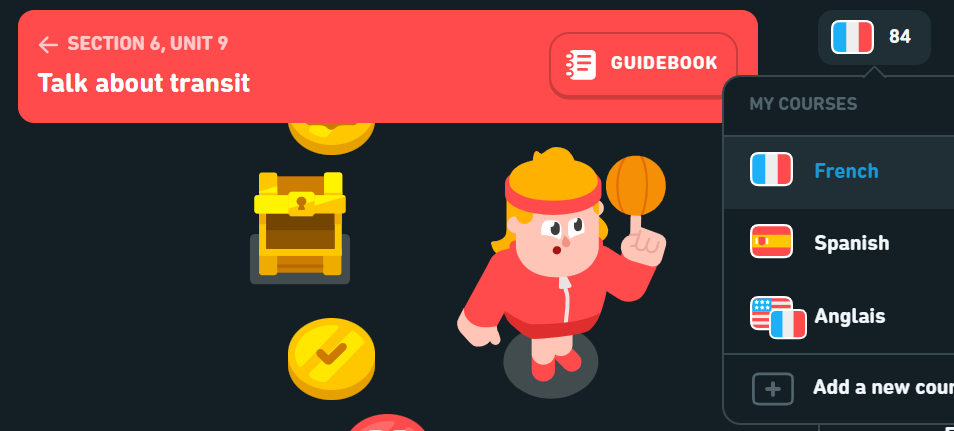
While I have reached Section 6 of the French course (French score 84/130), I have also just begun section 4 of the English (as a French user) course (English score 30/130).
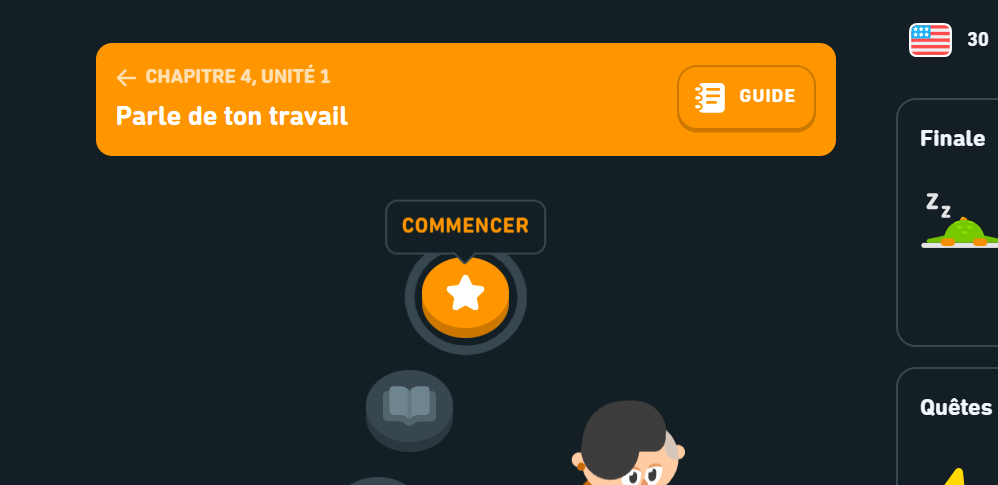
For both courses, Duo only offers content up to CEFR level B2 (advanced). As you can see, my English course is entirely in French, which helps me immerse myself further into French. I get to learn the French meanings of so many words (like section = chapitre, quests = quêtes, weekly league = ligue hebdomadaire, grammar tips = astuces de grammaire, etc.) before even delving into a lesson. And when I do, I get to learn so many concepts I haven’t in the French course. Luckily, bar Section 1 teaching basic concepts like greetings, introducing yourself (or your family), restaurant ordering, etc., there hasn’t been much overlap between topics on higher sections. For example, last week I learnt how to raconte mes aventures en colo (recount my summer camp adventures) in the English course and learnt so many new words like colo (camp), loisirs (hobbies), ragots (gossip), avoir hâte de (to look forward [to doing something]), and more….
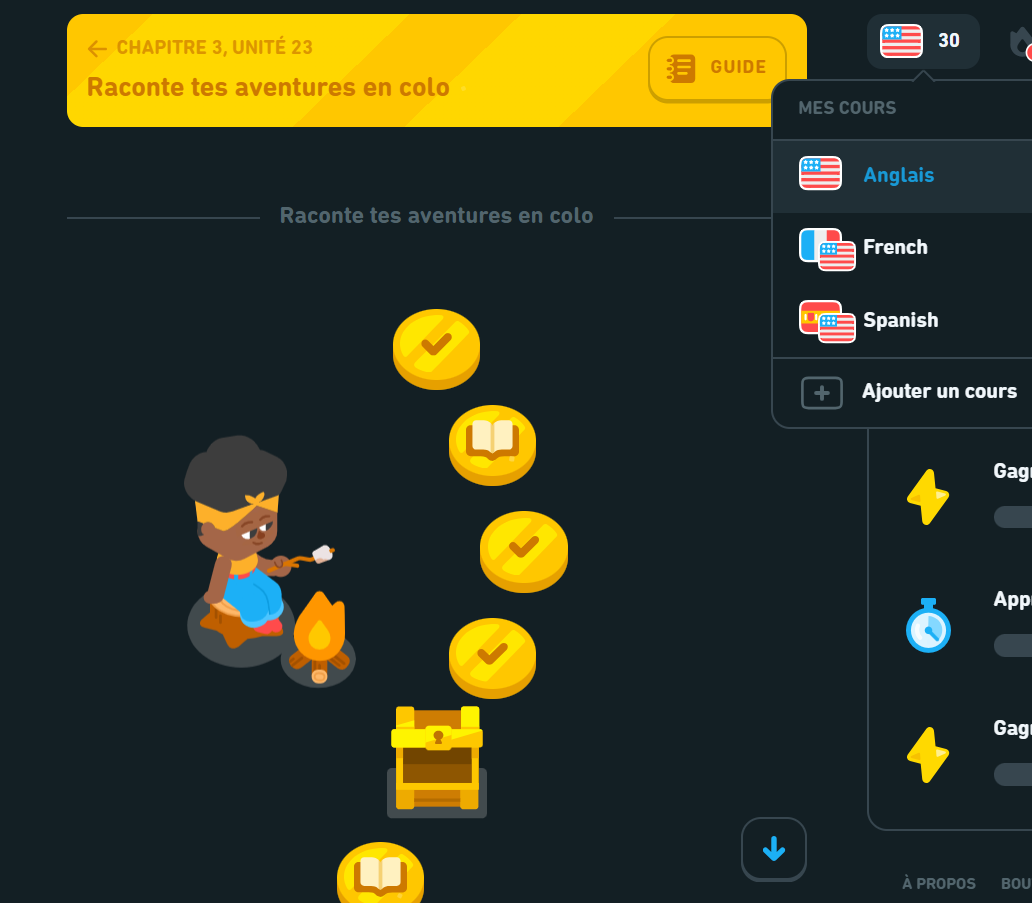
Pros: the French course has not yet taught me how to speak about camping, hobbies, learning languages (the irony!), and many more topics that the English course has. I am also improving my weaker concepts in English (like forms of past tense, negative adverb placement, and object-pronoun order) and further strengthening the same concepts in French by observing the differences between the two languages. It also gives me respite when I’ve learnt too much French for the day and want to switch it up but still want to be productively immersed in French learning, filling my French knowledge gaps while also applying the French I learn. Multilinguals for the win!
Cons: slows me down in my French course! But that has worked well for me as I get more time to memorize and internalize concepts through repetition. And speaking of repetition..
📚Legendary lessons: The Final Boss
Despite cons such as not explaining my mistakes and having very short guidebooks, Duo does one thing extremely well: providing opportunities for repetition. In addition to multiple lessons in reading, writing, listening, and speaking which drill concepts deeply, there’s also the Legendary mode which appears after you complete the set of lessons which make up a level (each unit has 9 lessons). These are extra-hard lessons that test how well you’ve really mastered a concept. Why are they more difficult, you ask?
Well the catch is, regular lessons allow for hints: just hover your mouse pointer on a word (in desktop mode) or tap on a word (in mobile versions) and it shows the translation. These become crutches as people overuse them to get through a lesson faster.
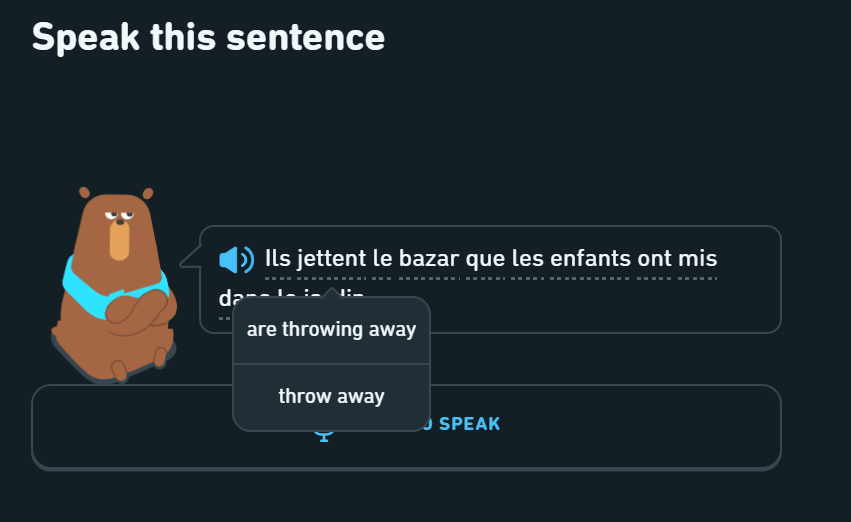
Legendary lessons don’t have these hints. Here’s how a legendary lesson looks. No underlined words means you see nothing when you tap them.
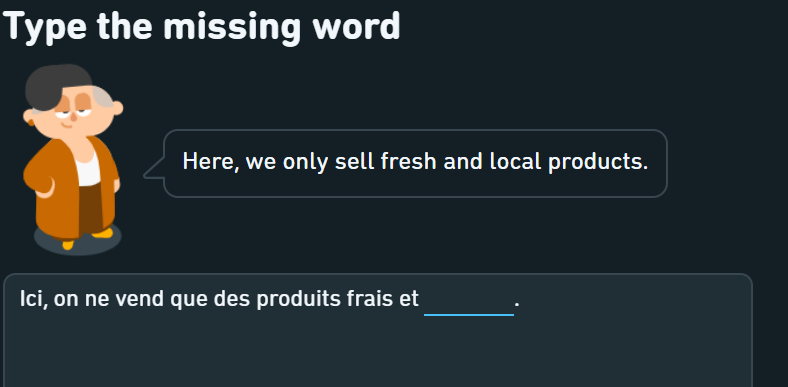
Looks like a very simple difference but it goes a long way.
Many people (including my boyfriend and my friends) speed through lessons to climb the leaderboard (weekly leagues or ranking boards) by accumulating XP. They skip the Legendary lessons to hurry up and advance to the next level. But these lessons are like the Final Boss of a game: they are a culmination of all concepts learnt in a lesson-set (level) and have the most advanced application-based questions. I go back and always do those. The result? A lot of repetition, memory recalls, internet searches to dig deeper, a lot of “ah, so that’s how that works,” and a deeper grasp of patterns that used to fly past me. I am forced to revisit and consolidate concepts. Furthermore, drilling concepts in a harder setting cements them. I’m not only memorizing words but also learning them deeply, in context, with nuance.
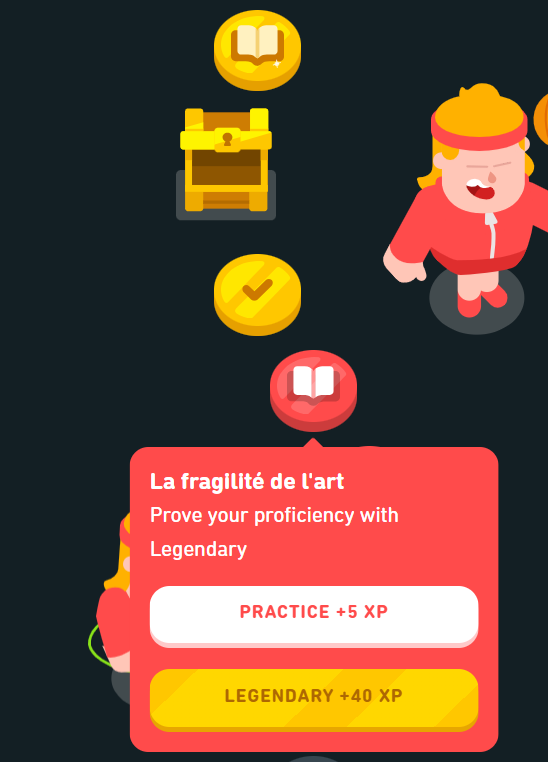
And also bragging rights as my course path has lessons turned to gold (literally and figuratively). These lessons aren’t just busy work but flex-worthy achievements. Weirdly (and proudly) satisfying.
But enough about Duolingo 😅(for now 😂). After all, Duo isn’t the only thing that keeps me motivated. There’s more on how I switch things up….
🌐 Living in French 24/7
This is a big one! It’s a bit crazy and I don’t recommend it for beginners. A few months ago, I decided to make a big change…
My phone and browser are set entirely to French!
That means every time I use my phone—checking the weather (la météo), scrolling my calendar (l’agenda), searching for my files (mes fichiers)—forces me to read, think, and sometimes puzzle through French naturally. Even mundane tasks become unavoidable micro-lessons. Swiping through apps has turned into a mini language lab. I no longer have the Camera app; it’s appareil photo now. Settings is now paramètres. The worst one by far was the (Sound) Recorder or enregistreur—as it’s now named on my phone. I couldn’t find it for hours.
Sometimes, I need to google or even translate whole pages. It’s chaotic, sure, but it’s also immersive in a way textbooks could never replicate. It’s surprisingly fun. I’ve adapted to fit a full-immersion, dual-language lifestyle. I’m constantly learning whether I want to or not. For instance, the other day my CIBC mobile banking app decided to ask me to accept a new cookies notice.
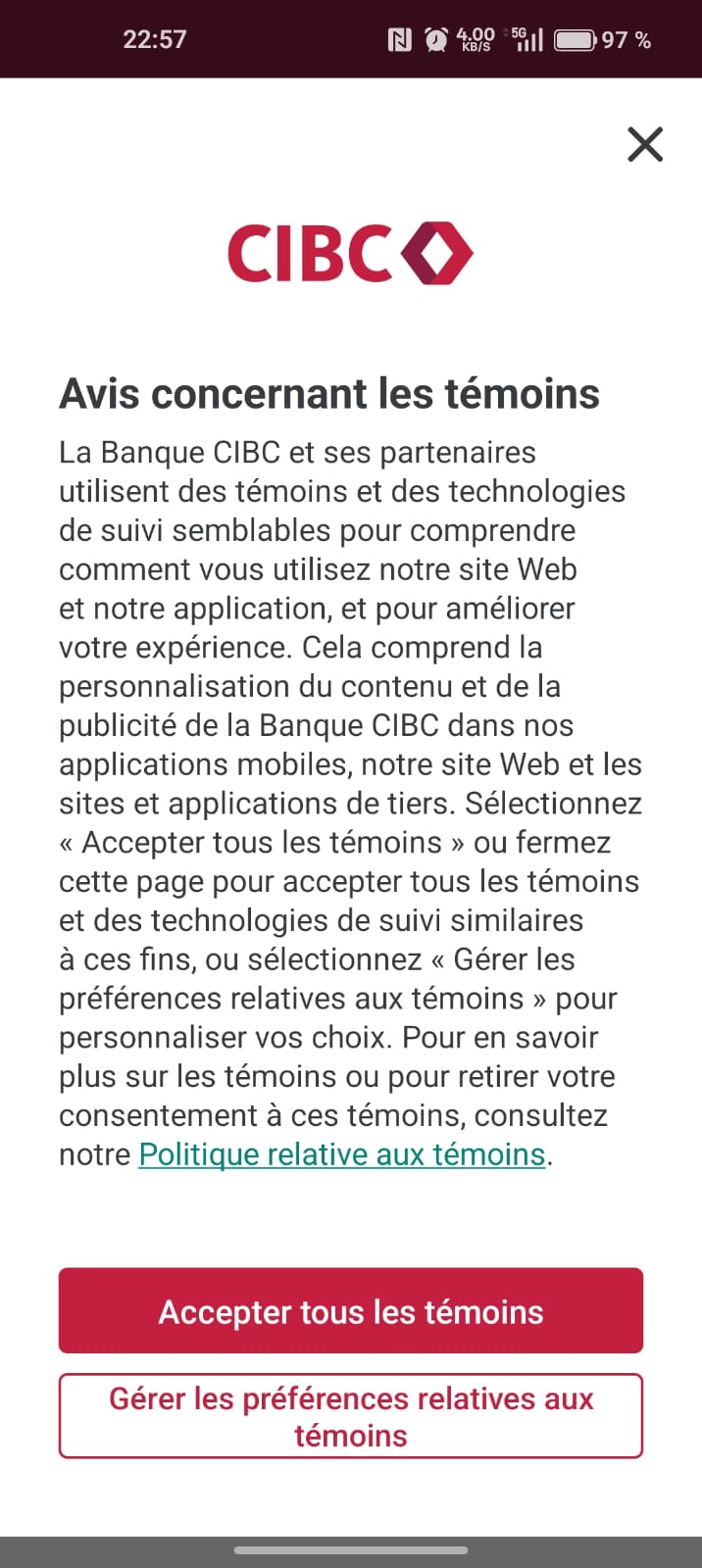
Imagine my horror when I saw the phrase Avis concernant les témoins. I really thought I was being served a notice (as I knew the word avis meant notice). Thankfully a quick google search of témoins eased my mind.. Phew! It just means cookies.
I swear every click is a tiny French test I didn’t sign up for. (Or maybe I did, unknowingly, when I switched the phone language). But I love it!
Now let’s move on to something I know I signed up for..
🎬 How I Fell Down the Roya Rabbit Hole
What started as me laughing at a YouTube Short turned into a full-on binge of Roya’s channel.
This was a hilarious short where her AirPods’ live translation decoded a French idiom, “J’ai d’autres chats à fouetter,” and blurted out “I have other cats to whip.” I paused and googled. A reddit post came to my rescue, and revealed that the idiom is actually the French version of “I have other fish to fry.” The translation app took that at face value. Roya gives up on her AirPods saying, “Either these things are broken or French is not a real language.” I laughed way too hard because I’ve been there. Word-to-word translations seldom work out. This frustration is a big lesson: knowing the literal meaning of words isn’t enough; the nuances of context contribute to the meanings of phrases and expressions.
That short led me to a longer video, “How to Learn Any Language Faster (From Someone Who Speaks Four)”.
where she breaks down her favorite strategies — most of which reinforced things I’ve accidentally been doing all along:
-
Label everything: She literally recommends putting sticky notes on your coffee maker, bookshelf, mirror — anything you use daily. (I might need to revive my sticky-note era for this.)
-
Watch shows that match your level: Children’s cartoons early on, then movies and reality TV as you progress — because they use real, informal language. She suggests watching shows where the main characters are the same age as you, so as to get exposure to the type of language you can relate to. Also, match the subtitles to your language level. Most importantly, focus on entertainment to make language learning fun. It can be more than a chore!
-
“Parrot” the dialogue: Repeat out loud what you hear to mimic rhythm and pronunciation.
-
Use language apps — but smartly: She warns they shouldn’t just be flashcards. They’re one of many tools. (Which made me feel oddly vindicated for spending so much time redoing my old Duolingo lessons.)
-
Immersion doesn’t mean perfection: Roya says to stop worrying about sounding flawless — fluency grows from messy, consistent practice.
By the end of that video, I realized I’ve kind of built my own “mini immersion” world — Duolingo’s structure, my devices in French, and now a steady dose of Roya’s humor and advice.
In Other News
A whole post without mentioning Taylor Swift? Impossible. Last week I streamed The Fate of Ophelia on repeat, and looped the music video. This week, I listened to this beautiful French version by Ambre Vallet instead.
I can proudly say I remember most of it. Sometimes I even start singing the French version instead of the original. I am also following what Roya said: listen to Music that you can relate to and belongs to your favorite genre.
Before I Say Goodbye, Some Shoutouts
Last week, Daegan suggested I used WordReference, which is essentially a dictionary website. Thank you wouldn’t even begin to express how useful it proved to be. I searched for many words and learnt so much about them, from different meanings of the same word to phrases that could be constructed using them. My search history says it all.
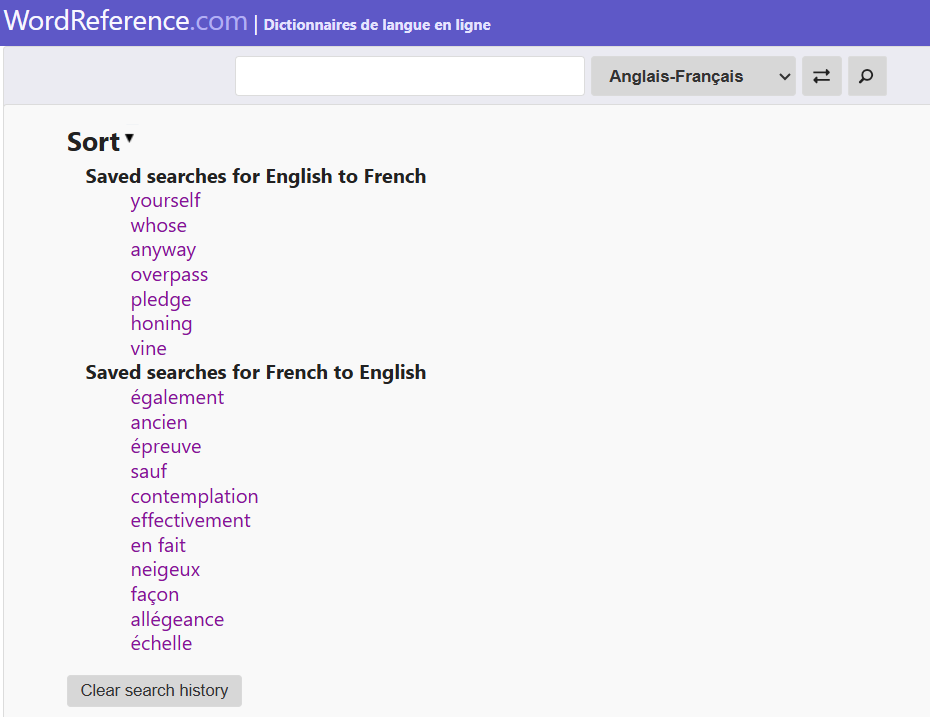
I was shocked to find out Carly was also a victim of the carpet = tapis story I told last week. From her Core French classes in elementary school, she also thought tapis means carpet (when it actually means rug). Carly also suggested some YouTube series for learning French in conversations called Easy French and Oh La La, I Speak French. I am going to look them up next week!
No, I Totally Didn’t Forget About It!
With all the talk about Duo earlier, how could I forget my progress update. This week, I was a phoenix rising from the ashes. Duolingo’s weekly progress email says it all. Also as you could see in the screenshots above, my French score is now 84. Nailed it!
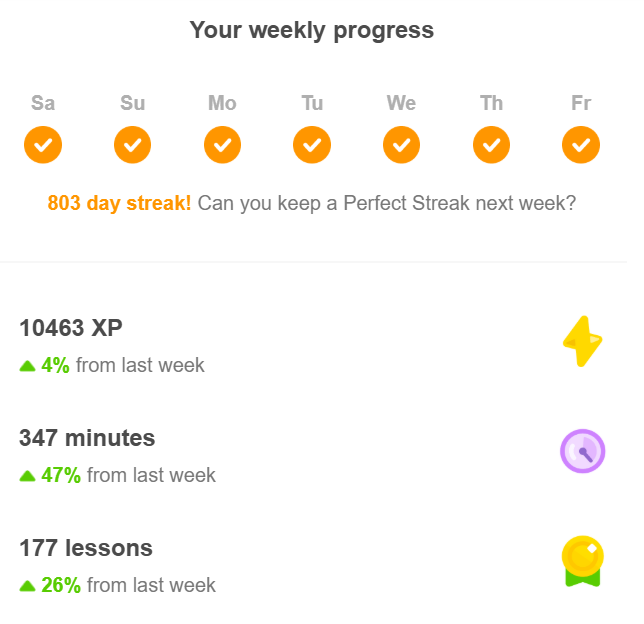
Next week, my target is to achieve a score of 85.
Until then — je continue à fouetter d’autres chats. 😏
Living my French speaking era,
Dishant